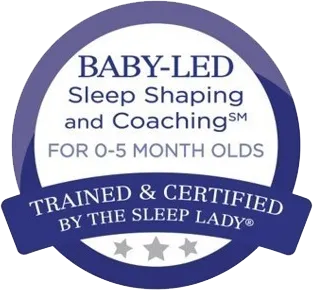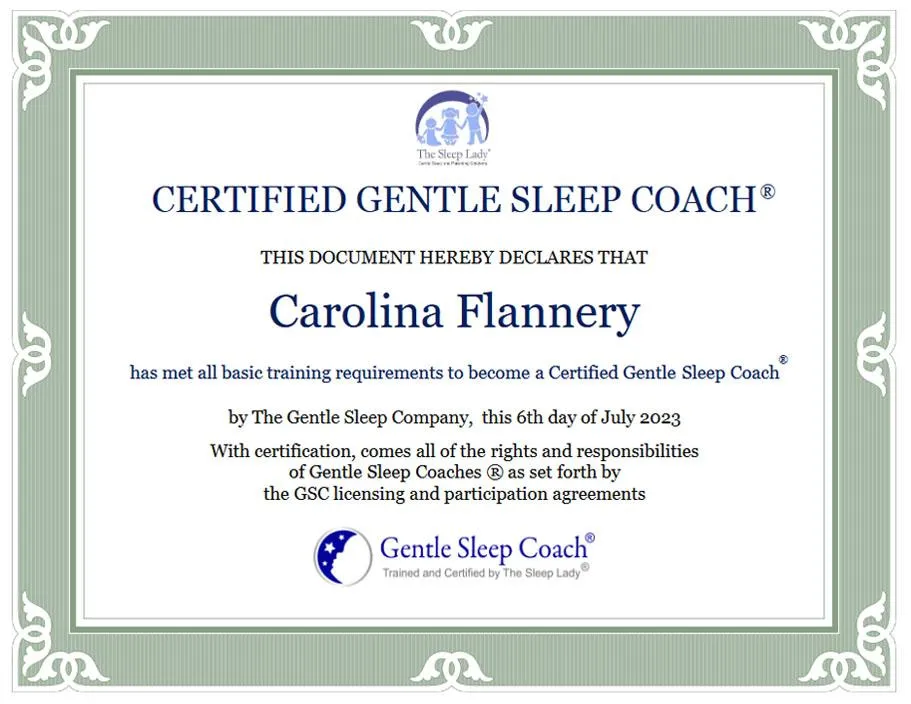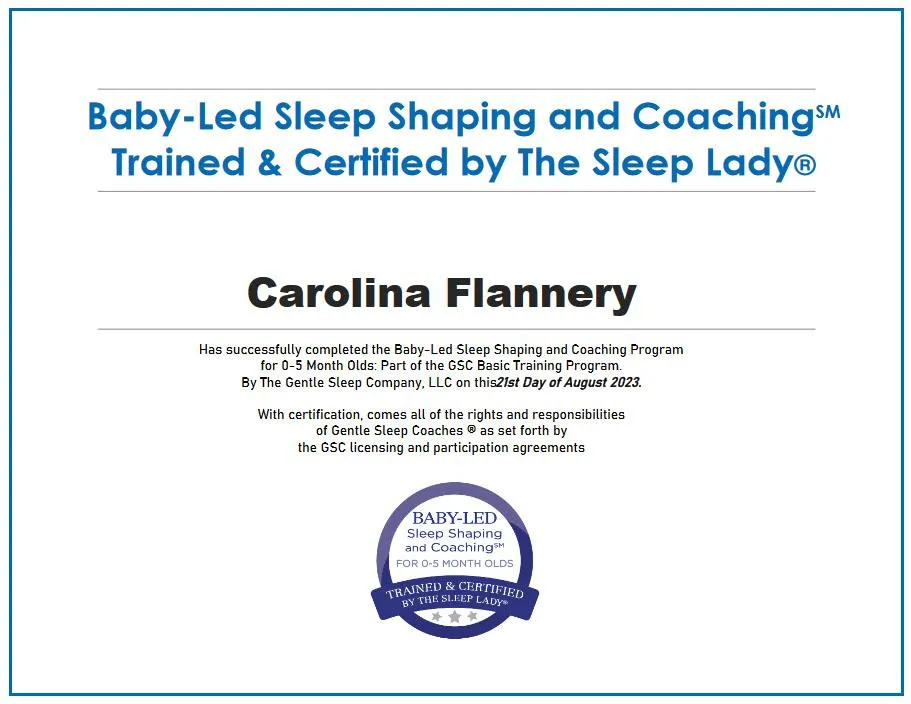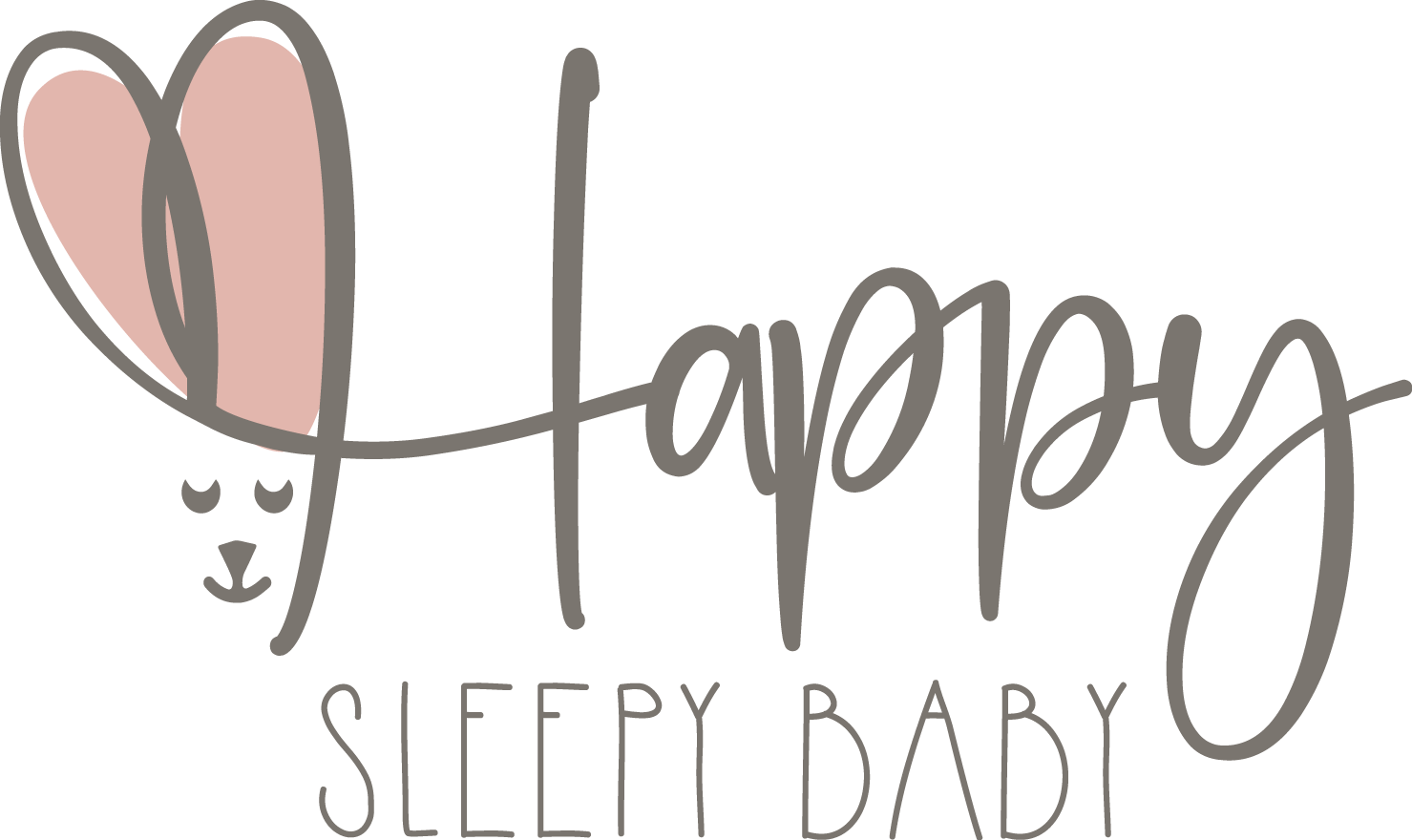Philosophy
The Gentle Sleep Coach® philosophy was developed by Kim West LCSW-C, The Sleep Lady ® because she found so many parents had difficulty following through with a sleep coaching program that they feared will damage their child emotionally or fill them with so much guilt they couldn’t follow through.
The GSC approach is a gentler alternative for families who emotionally or philosophically resist letting their babies cry it out: for families who tried “Ferber” (controlled crying) and it didn’t work, and for families who let their baby cry-it-out earlier but now find it doesn’t help. It is also for families who believe in co-sleeping but find that their children aren’t really sleeping all that well, even nestled snugly with their parents. Or for families who did co-sleep for a few months to a few years and now want the family bed to revert back to the marital one.
I will work with you to create an individualized, step-by-step sleep plan that will factor in your parenting philosophy, your child’s age, health and temperament, mother’s well-being and the related family dynamics. And most importantly I will support and coach you through the process from beginning to end for night sleep and naps!
Frequently Asked Questions
Can you guarantee “no crying” you might ask?
No, no one really can. For example, if you as the parent have taught your child that the way to fall asleep is to be held to sleep for all naps, bedtime, and wakings, and you decide that you want to change this; your child will naturally protest or resist this change. After all, they don’t know why you have changed your approach. If your child is pre-verbal, then they will cry. My goal is to have as little crying as possible. I encourage parents to be loving and responsive, but to allow the child the room to learn this vital life skill of putting themselves to sleep. The parent responds and stays with their child and offers physical and verbal reassurance without putting the child to sleep. This supports the development of a secure attachment between parent and child.
What age range is a GSC (Gentle Sleep Coach) trained to work with?
Babies from birth to 6 years old. Theres is no research to support that babies are developmentally ready to sleep training before 4 months of age. I offer sleep shaping for 0-5 months that follow realistic sleep expectations for a newborn, how to set up a good sleep foundation and most of all how to offer soothing strategies for this age group.
For babies 4 and 5 months old, I can assess when a baby is ready for gentle sleep training and where to start.
Do I have to stop breastfeeding to get my baby to sleep better?
Absolutely no! I support a mother who wants to continue to breastfeed while sleep coaching. If you decide to stop, I recommend using a gradual night weaning approach so you will never be coaching through hunger.
What is Sleep Coaching?
Refers to methods implemented by parents to improve their children’s sleep skills. My gentle sleep approach, will gradually give your children more and more space as you do less and less for them to figure out how to soothe themselves to sleep at night or naptime.
How will Sleep Coaching help my baby?
Sleep helps with brain development, boosts learning and memory, growth, heart health and immunity. You may also notice a happier, lighter mood, less fussiness and irritability, less sickness and more quality time with your baby due to improvement in your own mood and energy levels.
What is my job as a sleep coach?
A coach is a person who supports those who need assistance with their development. They don’t play the game or do the work for the players. Even when the team loses, the coach can provide strategies for doing better next time, but still can’t play the game for them. It’s the same with sleep; as a coach, I can support you in guiding your child to acquire the skills to fall sleep independently, just as they do it on their own.
How Long does it typically take to see results?
This depends on many factors including your child’s age, temperament, developmental stage, and methods that have been tried in the past. Most babies will sleep through the night within 2 weeks of starting and being consistent with your sleep coaching plan.
My Training & Certification

The Gentle Sleep Coach Program is the first and most extensive professional sleep coach training and certification program available. The program involves over 80 hours of training with a faculty panel that includes 2 medical doctors, a psychologist, an attorney, lactation counselor, postpartum doulas and a family therapist. Each coach must pass an exam and participate in case mentorship with Kim West, LCSW-C (a.k.a. “the Sleep Lady”) who has been helping tired parents for over 20 years. Clinical mentorship and ongoing advanced training are required to maintain certification as a Gentle Sleep Coach
Some of my training topics included:
Basic counseling and child development
Sleep science and behavioral modification techniques to help parents of children age 0 to 6 years old.
Secure attachment theory
Support for the breastfeeding mother
The training also consisted of lectures from top specialists, including:
Postpartum Depression from Dr. Shoshana Bennett, author and leading specialist on Postpartum Depression.
Medical Conditions and Sleep Apnea in Children led by Dr. Lewis Kass, Director of Children’s Sleep Center.
GERD and Sleep led by Dr. Anthony Loizides, pediatric gastroenterologist.
0-5 Month Old Training Summary

The GSC Program also includes an exclusive advanced training specifically focused on how to gently work with babies 0-5 months of age using the Baby-Led Sleep Shaping and Coaching. This gentle approach aids families to first shape their baby's sleep and then when appropriate (and according to their baby's unique temperament) offer alternatives to the "cry it out" method for newborns, based on an infant's developmental readiness to self soothe.
Some of the curriculum training topics include:
How feeding, attachment, soothing, and temperament all factor into your infant's sleep
The key developmental milestones from birth through five months and how to encourage sleep at every stage.
Safe co-sleeping guidelines
Guidance on how to assess when the baby is ready for sleep coaching based on current research and evidence-based strategies
This specialty training is designed to give Gentle Sleep Coaches the knowledge, education and all the tools and resources they need to successfully work with families of newborns through 5 months of age in a safe, healthy and developmentally appropriate manner.




